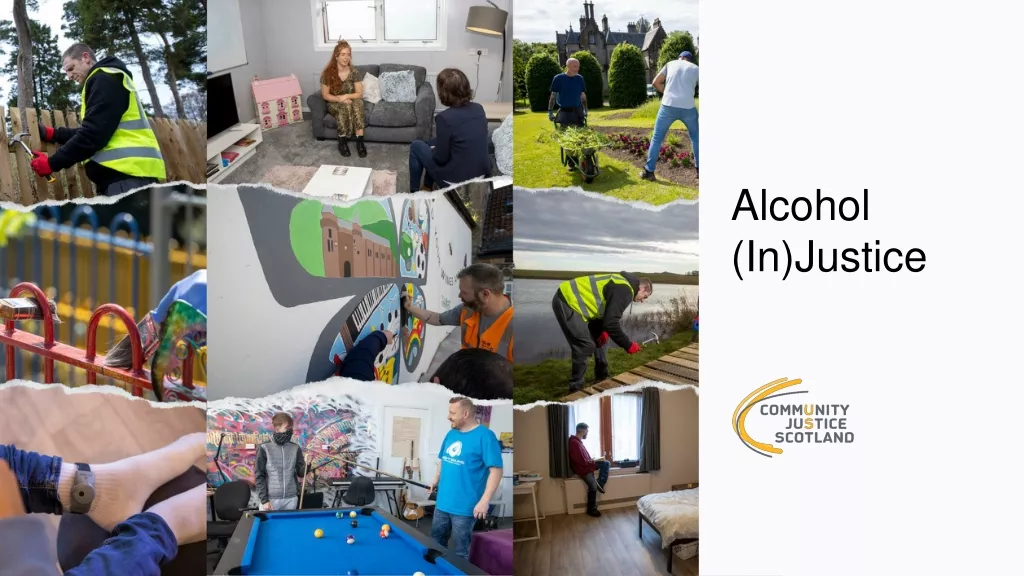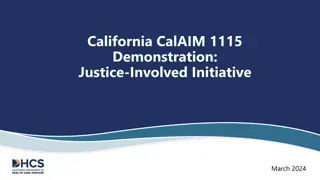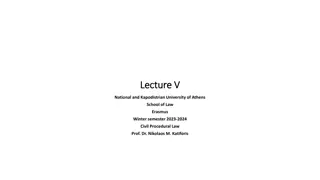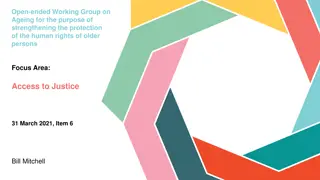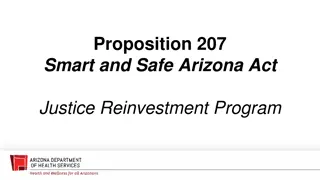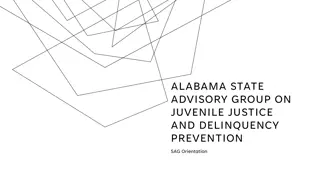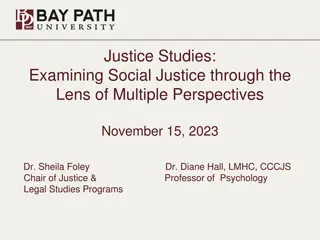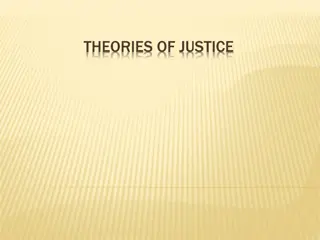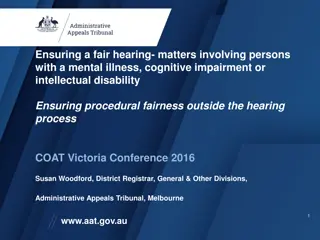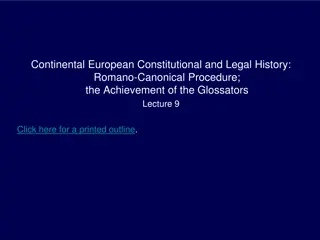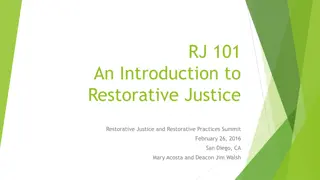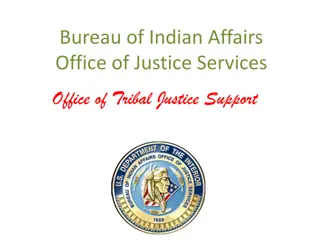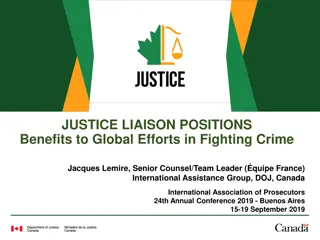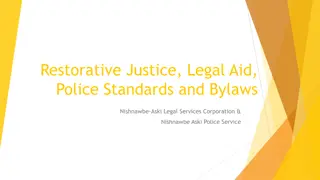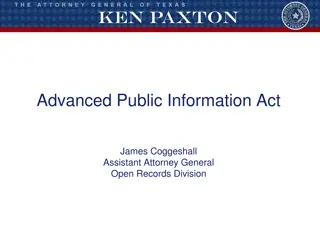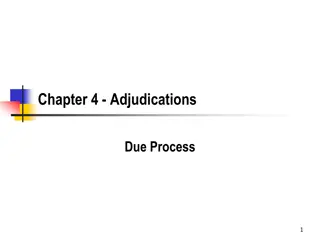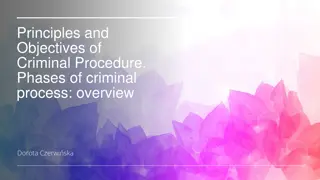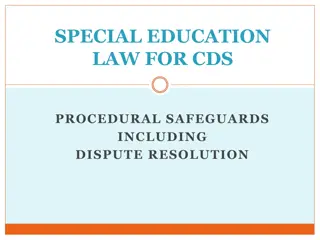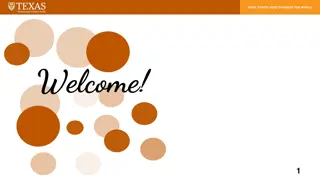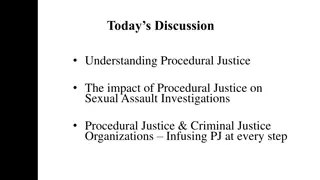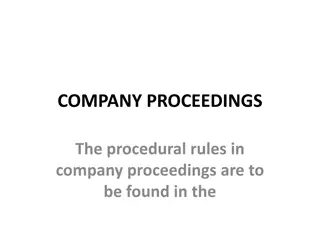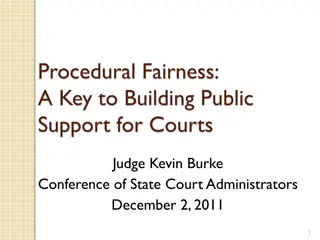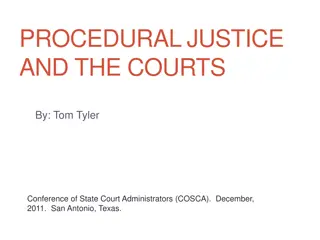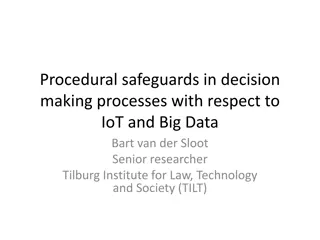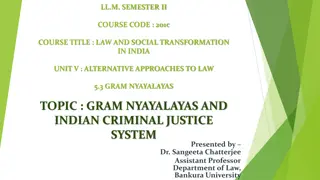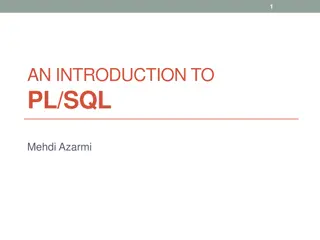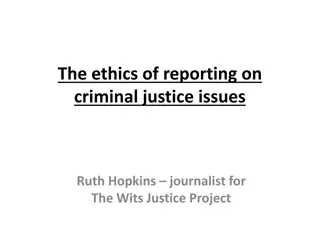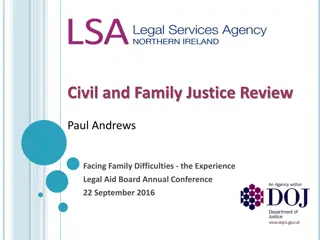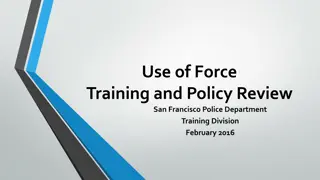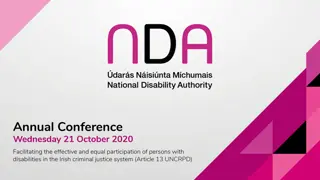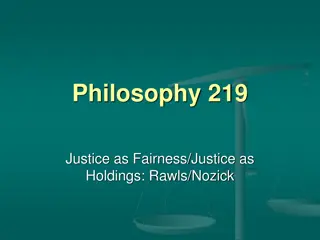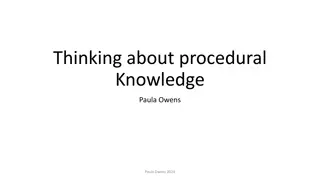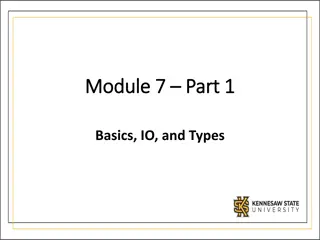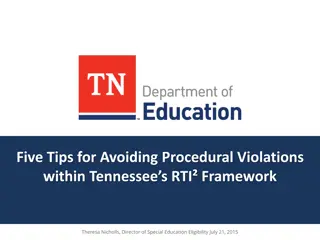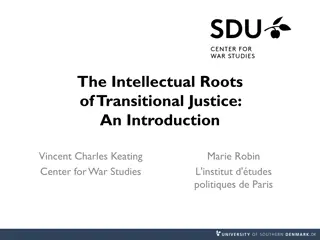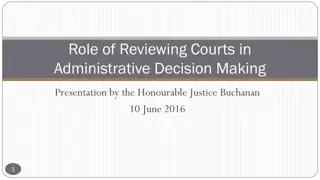Understanding Procedural Safeguards for Students with Disabilities
This information delves into the procedural safeguards for students with disabilities receiving special education services, covering topics such as laws governing procedural safeguards, parents' rights and responsibilities, abbreviation glossary, and the required Notice of Procedural Safeguards unde
1 views • 37 slides
Indiana Juvenile Justice Grant Programs RFPs Webinar Details
Indiana Criminal Justice Institute's Youth Services Division is seeking funding proposals for Juvenile Justice grant programs focusing on Community Alternatives, Diversion, and Behavioral Health. The programs align with House Enrolled Act 1359 and aim to enhance services for children in the juvenile
2 views • 30 slides
Exploring Community Justice Interventions for Alcohol-Related Offenses
This presentation delves into the various community justice options available for individuals involved in alcohol-related offenses. It outlines the justice process post charges, community justice programs, national policies, successful examples like CPOs with alcohol treatment, challenges faced, and
1 views • 22 slides
United Nations Survey on Crime Trends and Operations of Criminal Justice Systems
The United Nations Survey on Crime Trends and Operations of Criminal Justice Systems (UN-CTS) focuses on harmonizing data collection, identifying crime patterns, improving monitoring of the criminal justice system, and enhancing international comparability of crime statistics. It was mandated by the
3 views • 18 slides
California CalAIM Justice-Involved Initiative Overview
California's CalAIM Justice-Involved Initiative focuses on supporting individuals involved in the justice system by providing key services pre-release, enrolling them in Medi-Cal coverage, and connecting them with essential behavioral health and social service providers for successful reentry. The i
0 views • 15 slides
Proceedings for Provisional Remedies in Civil Procedural Law
Greek legal theory distinguishes between conservatory and regulatory provisional remedies to secure substantive rights or provisionally arrange disputed situations. These remedies are constitutionally guaranteed and granted under specific substantive and procedural conditions. The procedure involves
0 views • 14 slides
Addressing the Justice Gap for Older Persons in Access to Justice
Older persons face a significant justice gap, with millions unable to access civil, administrative, or criminal justice. The absence of dedicated international norms, ageism, and limited UN frameworks contribute to this issue. Barriers include lack of specialist services, digital exclusion, and inad
0 views • 16 slides
Smart and Safe Arizona Act: Justice Reinvestment Program Overview
The Smart and Safe Arizona Act, passed by Arizona voters in November 2020, allows for the legalization, taxation, and recreational use of marijuana for adults 21 and over. The Justice Reinvestment Program entails the distribution of funds to county health departments and nonprofit organizations for
1 views • 9 slides
Alabama State Advisory Group on Juvenile Justice and Delinquency Prevention Orientation
This presentation serves as an orientation for members of the Alabama State Advisory Group on Juvenile Justice and Delinquency Prevention, providing an overview of the group's role in implementing the ADECA LETS Title II Part B Formula Grant Program. Key terms related to juvenile justice are explain
0 views • 19 slides
Exploring Social Justice Perspectives and Educational Practices
Dive into the world of social justice through various lenses, from examining human experience to promoting fairness in society. Discover the importance of reforms in areas like policing and juvenile justice, and explore curricular changes in justice studies. Learn how to promote social justice in yo
1 views • 21 slides
Theories of Justice and Rawls' Principles Explained
Explore various theories of justice including comprehensive, principle-based, and contextual approaches, along with types of justice such as procedural and distributive. Delve into Rawls' social contract and principles of justice focusing on fairness and equality. Discover how Rawls envisions a just
2 views • 22 slides
Ensuring Fair Hearing in Legal Proceedings for Individuals with Disabilities
Susan Woodford discusses the importance of procedural fairness in legal proceedings involving individuals with mental illness, cognitive impairment, or intellectual disability. She emphasizes the need for flexibility in adopting fair procedures tailored to each case, including providing information
0 views • 7 slides
Overview of EPPO and Procedural Rights in EU Law
This material focuses on the European Public Prosecutor's Office (EPPO) and its adherence to procedural rights within the framework of EU law. It covers the provisions of the EPPO Regulation related to procedural rights, including principles of rule of law, impartial investigations, and judicial rev
0 views • 22 slides
Evolution of Procedural Law in Continental European Legal History
The journey of procedural law in Continental European legal history, from the challenges faced by glossators in creating Romano-canonical procedure to the discussions on canonic procedure in canon law. Explore the intricacies of legal procedure development and the influences of historical texts such
0 views • 36 slides
Understanding Restorative Justice: A Path to Healing and Justice
Restorative justice is a transformative approach focusing on repairing harm caused by crime. It emphasizes meeting victim needs, offender accountability, and community involvement. This method, different from retributive justice, aims for full resolution and healing. Originating from indigenous prac
0 views • 15 slides
Bureau of Indian Affairs Office of Justice Services
The Bureau of Indian Affairs Office of Justice Services, along with the Office of Tribal Justice Support, plays a crucial role in supporting Tribal Justice systems across various Native American tribes in the United States. They provide assistance in areas such as criminal law, diversion and re-entr
0 views • 13 slides
Canada's Justice Liaison Positions: Enhancing Global Fight Against Crime
Canada's justice liaison positions play a vital role in facilitating international cooperation and communication between diverse legal systems, particularly with France. By bridging communication gaps and navigating different procedural rules, these positions support global efforts in fighting crime
0 views • 13 slides
Nishnawbe Aski Legal Services Corporation & Restorative Justice Initiatives
Nishnawbe Aski Legal Services Corporation (NALSC) focuses on promoting restorative justice and providing legal aid services within the Nishnawbe Aski Nation (NAN) territory. The organization's foundation mandate, established through resolutions by NAN Chiefs, emphasizes the revitalization of traditi
0 views • 25 slides
Open Records and Requests Process Overview
This presentation provides valuable information on the Advanced Public Information Act, open records letter rulings issued between 2001-2017, withdrawing requests for rulings, requesting previous determinations, and procedural obligations under Section 552.301. It covers reasons for withdrawal, comm
0 views • 35 slides
Exploring Due Process: Substantive and Procedural Dimensions
Dive into the intricacies of substantive and procedural due process, understanding the limits on government regulation and the significance of fair procedures in affecting individual rights. Explore the evolution of due process from historical perspectives to modern interpretations, reflecting on it
1 views • 27 slides
Objectives of Criminal Proceedings in Various Legal Systems
The objectives of criminal proceedings aim to ensure justice by acquitting the innocent and convicting the guilty, while also upholding the rule of law, protecting legally recognized interests, and resolving cases efficiently. This overview covers the principles and objectives of criminal procedure
0 views • 25 slides
Understanding Special Education Law and Procedural Safeguards for Children with Disabilities
Learn about the procedural safeguards that educational institutions must implement for children with disabilities, including the provision of annual notice, independent evaluations, parental consent, access to records, and dispute resolution options. Discover who these safeguards apply to – parent
0 views • 28 slides
Procedural Decomposition and Static Methods in Programming
Understanding procedural decomposition and static methods is essential in programming to reduce redundancy, organize code effectively, and manage complexity. Procedural decomposition involves dividing a problem into methods, while static methods help in code reuse and managing complexity. By designi
0 views • 18 slides
Understanding Procedural Justice and Its Impact on Criminal Justice Organizations
Procedural justice emphasizes fairness, respect, and transparency in decision-making processes. This approach can lead to positive organizational changes, improved community relationships, and increased trust and legitimacy. The four pillars of procedural justice include fairness in rule application
0 views • 12 slides
Understanding Procedural Rules in Company Proceedings
Procedural rules governing company proceedings can be found in the Companies Proceeding Rules, Companies Winding-Up Rules, and the Federal High Court (Civil Procedure) Rules. These rules dictate the process for applications, such as Originating Summons, Originating Motion, or Petition under CAMA. Th
0 views • 22 slides
Understanding Public Perceptions of Courts and Judges
Exploring public opinions on procedural fairness in courts, this content discusses the influence of judges' political views, aspirations for higher courts on their impartiality, and the divided nation on interpreting the Constitution. It also highlights the complexities of public knowledge about the
0 views • 24 slides
Understanding Procedural Justice and Public Trust in the Justice System
The discussion delves into the goals of the justice system, the importance of public trust and confidence, and the concept of legitimacy in the context of the courts. Despite improvements in the delivery of justice, trust and confidence among Americans, especially in minority groups, remain a challe
0 views • 39 slides
Procedural Safeguards in Decision-Making Processes with Respect to IoT and Big Data
Bart van der Sloot, a Senior Researcher at Tilburg Institute for Law, Technology, and Society, discusses procedural safeguards in decision-making processes related to IoT and Big Data. The overview includes topics such as access and use paradigms, decision-making in GDPR and ECHR, and the importance
0 views • 33 slides
Gram Nyayalayas: Enhancing Justice at the Grassroots Level in India
Indian Criminal Justice System has evolved over the years to ensure justice reaches every individual efficiently. The introduction of Gram Nyayalayas represents a significant step towards this goal by establishing formal mobile courts in villages. These courts aim to enhance access to justice and pr
0 views • 16 slides
Introduction to PL/SQL: Oracle's Procedural Language Extension
PL/SQL is Oracle's extension to SQL, combining the power of SQL with the procedural constructs of a 3GL. This introduction covers the basics of PL/SQL blocks, block structure, variables and types, executable sections, and example variable declarations. It also highlights the features such as error h
0 views • 29 slides
Exploring Ethics in Criminal Justice Reporting by Ruth Hopkins at The Wits Justice Project
This piece delves into the importance of ethical considerations when reporting on criminal justice issues, as highlighted by journalist Ruth Hopkins at The Wits Justice Project. The article features quizzes posing ethical dilemmas faced by reporters, emphasizing the need for transparency, corroborat
0 views • 15 slides
Reforming Civil and Family Justice System Recommendations
The Civil and Family Justice Review presents key recommendations for reforming the justice system, including the establishment of a unified Family Court, emphasis on problem-solving courts, and promoting solutions outside the court system. Access to Justice Review II focuses on Family Justice Reform
0 views • 8 slides
San Francisco Police Department Training Updates 2016
San Francisco Police Department implemented various training updates in 2016 including Use of Force Training and Policy Review, Changes in Firearms Training and Qualifications, Mandated Force Options Training, and Procedural Justice & Legitimacy Course. The updates aim to enhance officer training, e
0 views • 14 slides
Ensuring Justice and Support for People with Disabilities in the Criminal Justice System
Research highlights the overrepresentation of individuals with intellectual disabilities and mental health issues in the criminal justice system, underscoring the need for effective access to justice and appropriate accommodations. The Probation Service aims to rehabilitate offenders through communi
0 views • 12 slides
Rawls' Theory of Justice: Balancing Liberty and Equality
John Rawls, a prominent American philosopher, introduced his theory of justice in his influential book "A Theory of Justice." He emphasized the importance of distributive justice and rational choices in shaping fair social arrangements. Rawls believed in a principle where rational agents would selec
0 views • 16 slides
Understanding Procedural Knowledge in Geography Education
Procedural knowledge in geography education involves developing geographical skills such as map reading, fieldwork, and enquiry. It focuses on how students gather, analyze, present, and interpret spatial information using tools like globes, atlases, and maps. This knowledge is essential for students
0 views • 4 slides
Understanding Python and Java Basics: Procedural vs. Object-Oriented, Interpreted vs. Compiled
Python and Java are both procedural and object-oriented languages. Python is an interpreted language, while Java is compiled. They differ in how code is processed, executed, and optimized. Learn about their syntax, interpreter vs. compiler, class structure, comments, and basic I/O operations.
0 views • 23 slides
Avoiding Procedural Violations in Tennessee's RTI Framework
Gain valuable insights on avoiding procedural violations within Tennessee's Response to Intervention (RTI) framework through the guidance provided by Theresa Nicholls, Director of Special Education Eligibility. Learn about the risks associated with procedural violations, review pertinent case law, r
0 views • 29 slides
Understanding Transitional Justice: An In-depth Exploration
Transitional justice is a response to widespread human rights violations, aiming to acknowledge victims and promote peace, reconciliation, and democracy. This concept involves adapting justice to societies transforming after periods of abuse. It explores contentious terms, ethical goals, potential j
0 views • 7 slides
Role of Reviewing Courts in Administrative Decision Making Presentation
The presentation by the Honourable Justice Buchanan on the role of reviewing courts in administrative decision-making highlights key legal cases and principles. It explores the delicate balance between judicial review and administrative decision-makers' discretion, emphasizing the importance of proc
1 views • 38 slides


